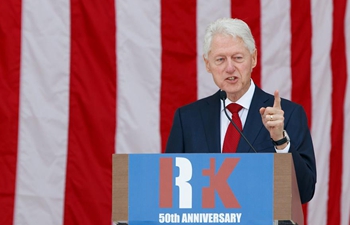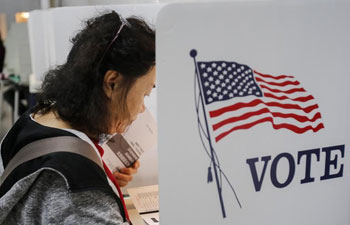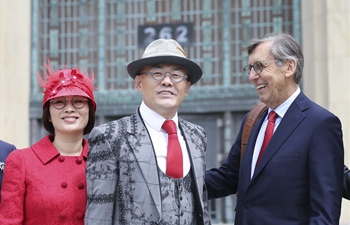LOS ANGELES, June 7 (Xinhua) -- Chinese Americans in California, with a total population of 1.8 million, have played an active role in the primary elections held Tuesday in the western U.S. state of California with high voter turnouts.
Voters elected candidates for statewide and congressional offices, and some local elected positions.
Though Chinese Americans only have a relatively small number of qualified voters, their votes may be decisive in some tight races.
The voting pattern of Chinese Americans in California has changed over the years. They focus not only on racial background, but other, more important factors.
"I voted for John Chiang in the governor race," said a resident of Arcadia who only gave his surname Chen. Arcadia is one of the cities in San Gabriel Valley where there are many Chinese.
The Chinese American community has been growing substantially in California in recent decades. The Asian American population grew 22 percent between 2000 and 2010 in San Gabriel Valley in the Greater Los Angeles metropolitan area, according to a report released by the Asian Americans Advancing Justice - Los Angeles in February.
San Gabriel Valley is known for its vibrant Chinese American community as Chinese Americans make up over half of its Asian American population.
"Chiang is a Chinese American, and he will help the Chinese community if elected as the governor of California," said Chen.
Chiang, the current treasurer of California, a Democrat, was unable to advance to the general election, but he still received 9 percent of votes in the primary.
Incumbent Democratic Rep. Judy Chu had a strong showing at 83.4 percent of the vote against her single challenger. She is the first Chinese American woman elected to the U.S. Congress. She serves as the U.S. Representative for California's 27th Congressional District, and has served in Congress since 2009.
Ted Lieu, an incumbent congressman running for re-election, and Philip Chen and Ed Chau, incumbent Assembly members, easily won the primary. Mike Eng, a candidate for state senator, will advance to the general election. Ling Ling Chang will replace the recalled Democratic State Senator Josh Newman.
But Li, a Walnut resident who only provided his surname, told Xinhua that racial background was not a factor when he cast his ballot.
"What really matters is a candidate's position on key issues," he said.
"It is understandable for Chinese American voters to vote for a candidate with a Chinese background," Li added. "However, it is unrealistic to think that only the candidate with the same racial background can and will help the Chinese community."
Under the unusual primary election system approved by Californian voters in 2010, the top two candidates with the most votes advance to the general election regardless of their party affiliation.
In the gubernatorial race, Gavin Newsom, current Lieutenant governor and former San Francisco mayor, who won the first place in the primary, will face his Republican challenger John Cox, a business executive from San Diego, in November.
In the U.S. senate race, the 84-year-old incumbent Dianne Feinstein won against the other candidates, and will face Kevin de Leon, a fellow Democrat, in the general election.
Democrats invested a lot of resources in the congressional races in California, hoping to flip some seats currently held by Republicans. Their efforts appear to be paying off. Though Republican candidates in the districts targeted by Democrats were able to advance to the general election, they will face an uphill battle with their Democratic challengers in November.













